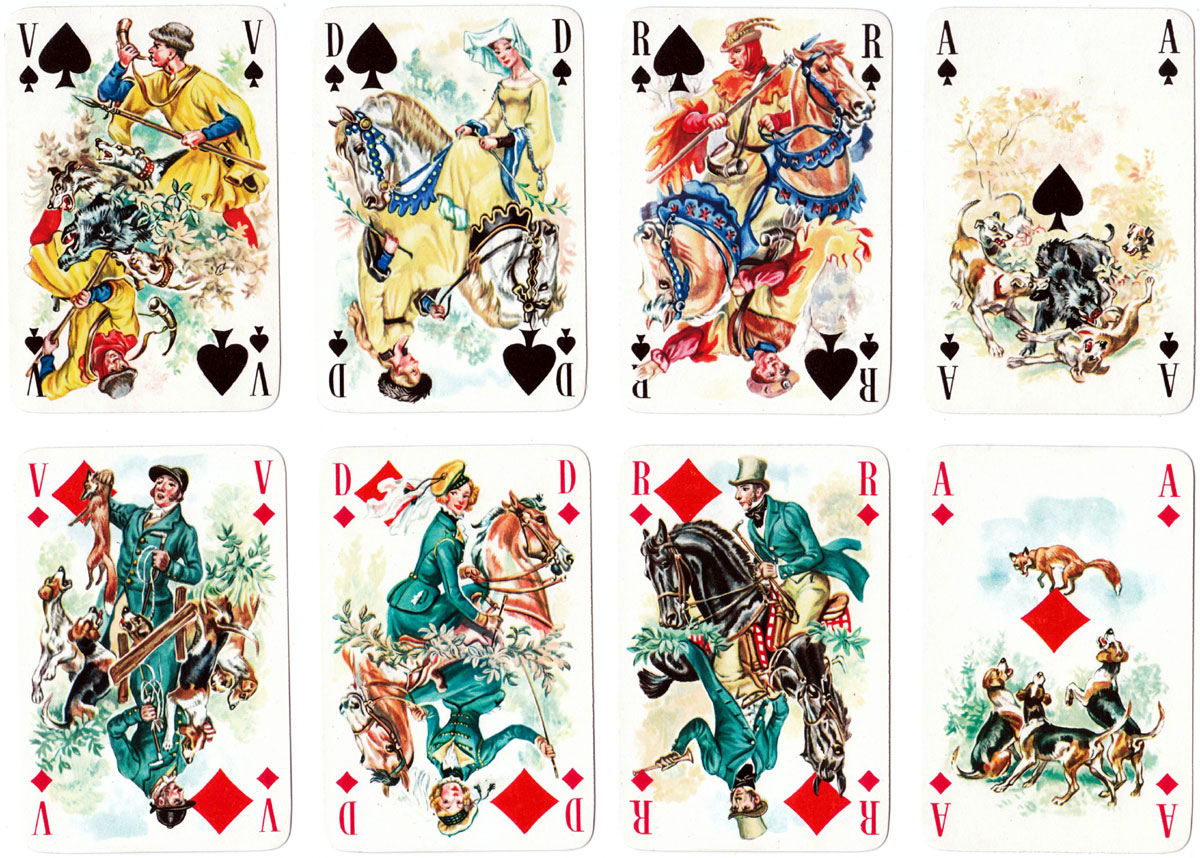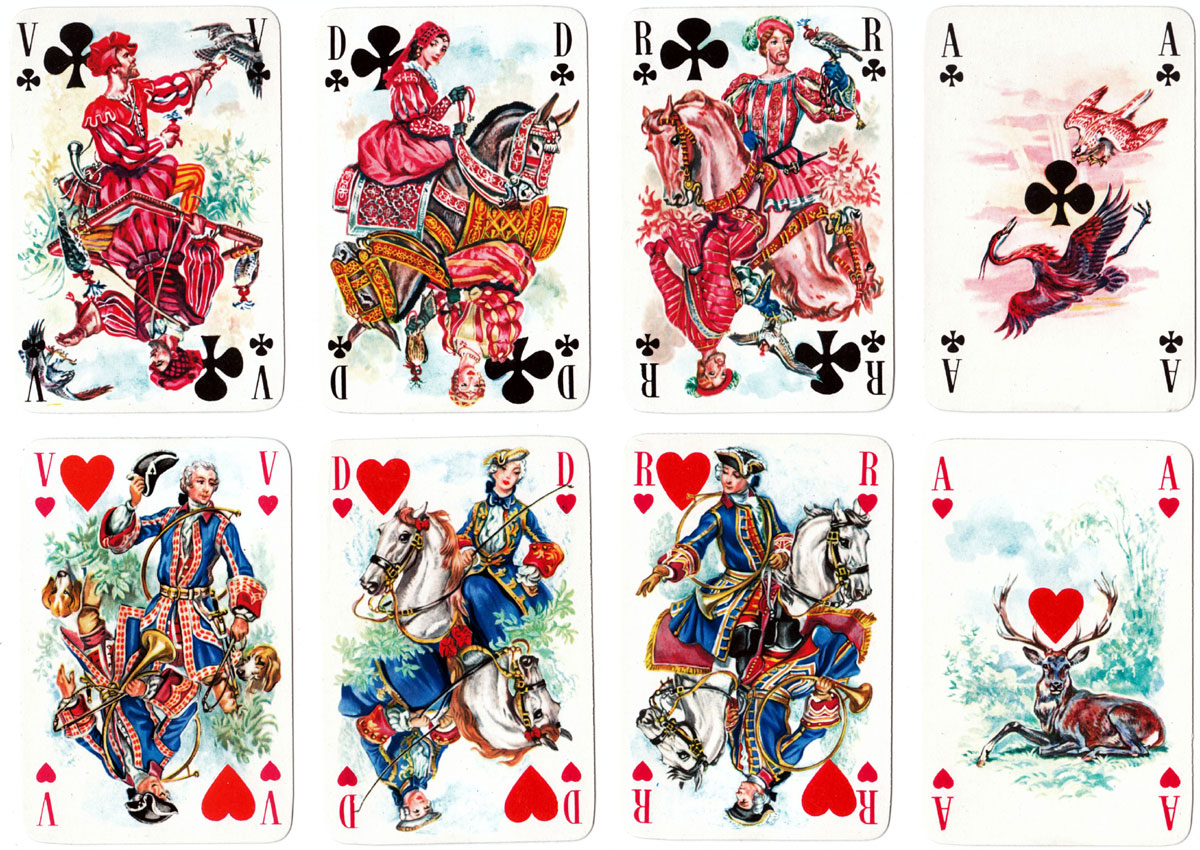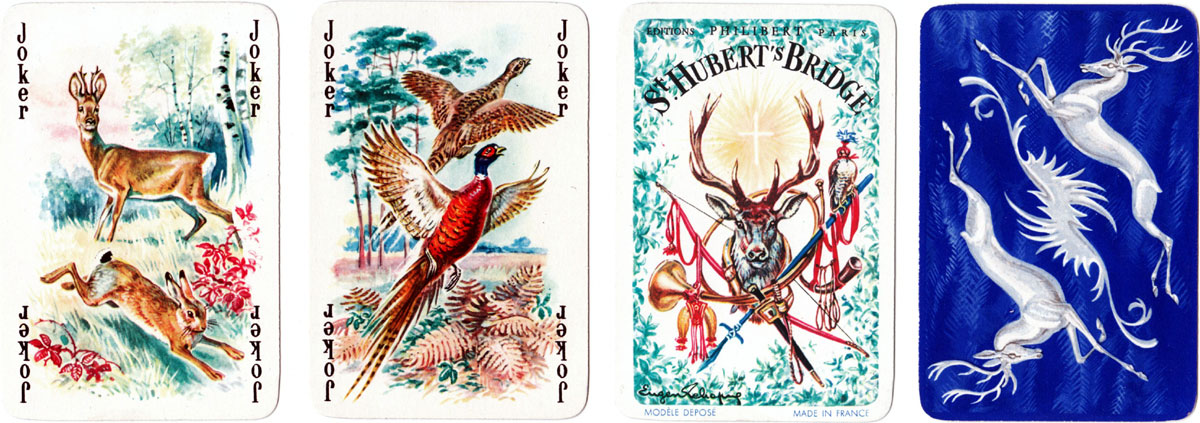St Hubert’s Bridge
“St Hubert’s Bridge” published by Éditions Philibert, Paris, c.1956.
“St Hubert’s Bridge” playing cards published by Éditions Philibert, Paris, 1956, featuring original watercolour artwork by Eugène Leliepvre celebrating the Feast of St. Hubert of Liège (3rd Nov), the patron saint of hunting. The stylised scenes are as follows: spades = boar hunting in the middle ages; diamonds = fox hunting in XIX century England; clubs = falconry in the Renaissance; hearts = deer hunting in the XVIII century. (images are reversible - click to see up-side-down.)


(images are reversible - click to see up-side-down)

Above: “St Hubert’s Bridge” published by Éditions Philibert, printed by Draeger Frères, Paris, c.1956. 52 cards + 2 jokers + title card + extra card, gilt edges. The jokers depict a Roebuck and Royal Pheasant, the title card depicts symbols of deer hunting & falconry. Images courtesy Rex Pitts.

By Rex Pitts (1940-2021)
Member since January 30, 2009
Rex's main interest was in card games, because, he said, they were cheap and easy to get hold of in his early days of collecting. He is well known for his extensive knowledge of Pepys games and his book is on the bookshelves of many.
His other interest was non-standard playing cards. He also had collections of sheet music, music CDs, models of London buses, London Transport timetables and maps and other objects that intrigued him.
Rex had a chequered career at school. He was expelled twice, on one occasion for smoking! Despite this he trained as a radio engineer and worked for the BBC in the World Service.
Later he moved into sales and worked for a firm that made all kinds of packaging, a job he enjoyed until his retirement. He became an expert on boxes and would always investigate those that held his cards. He could always recognize a box made for Pepys, which were the same as those of Alf Cooke’s Universal Playing Card Company, who printed the card games. This interest changed into an ability to make and mend boxes, which he did with great dexterity. He loved this kind of handicraft work.
His dexterity of hand and eye soon led to his making card games of his own design. He spent hours and hours carefully cutting them out and colouring them by hand.
Related Articles

Modern Swiss-German Pattern (carta.media)
Modernizing tradition: balancing clarity and continuity in regional card design.

Archaic Spanish-suited pattern from Bayonne
Archaic Franco-Spanish pattern from Bayonne by a manufacturer with the initals M.V.

Tactics Design
Late modernist Japanese playing cards designed by Masayoshi Nakajo for Tactics Design.

Caisse Mutuelle d'Assurance et de Prevoyance
Insurance propaganda pack for Caisse Mutuelle d'Assurance et de Prevoyance with humorous artwork by ...

The Decadent Deck
Studies in the eroticism of the female body by Inge Clayton.

Historic Shakespeare
“Historic Shakespeare” playing cards featuring Shakespearean characters by Chas Goodall & Son.

Sunday Night / Nichiyoubi no Yoru
An irreverent, avant-garde deck unofficially titled "Nichiyoubi no Yoru" (Sunday Night), designed by...

Angel 52 Secrets
Vintage “52 Secret” art deco-inspired playing cards from Japan.

Emilio Tadini playing cards
Beautiful dreamlike playing card designs by Emilio Tadini.

Jeu Révolutionnaire
Court cards and aces from a French Revolutionary pack by Pinaut, Paris, c.1794.

French Revolutionary cards by Pinaut
Seven cards from a French Revolutionary pack by Pinaut featuring characters from classical antiquity...

Zürcher Festspiel 1903
Swiss-suited pack designed by Robert Hardmeyer featuring figures from art and politics.

Never Mind the Belote
Limited edition Belote pack with designs by a collective of 24 street artists.

Sannois dans les étoiles
Celebrities and buildings associated with Sannois, a commune in the suburbs of Paris.

Playing card designs by Franz Exler
Reconstruction of playing cards from the original 1903 designs.

MITSCHKAtzen
Clever cat designs by the Austrian artist and illustrator Willi Mitschka.
Most Popular
Our top articles from the past 28 days

